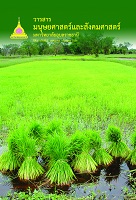ความเชื่อด้านสุขภาพและพฤติกรรมการป้องกันโรคอ้วนในเด็กนักเรียนชั้นมัธยมศึกษาที่มีภาวะโภชนาการเกิน กรณีศึกษาโรงเรียนมัธยมตระการพืชผล จังหวัดอุบลราชธานี
Main Article Content
บทคัดย่อ
การวิจัยเชิงพรรณนาแบบภาคตัดขวาง (Cross-sectional descriptive research) มีวัตถุประสงค์เพื่อศึกษา ความเชื่อด้านสุขภาพ พฤติกรรมการป้องกันโรคอ้วน และความสัมพันธ์ระหว่างความเชื่อด้านสุขภาพ กับพฤติกรรมการป้องกันโรคอ้วนในเด็กนักเรียนชั้น มัธยมศึกษาที่มีภาวะโภชนาการเกิน กรณีศึกษา โรงเรียนมัธยมตระการพืชผล จังหวัดอุบลราชธานี จำนวนทั้งหมด 128 คน เก็บรวบรวมข้อมูลโดยใช้แบบสอบถาม วิเคราะห์ข้อมูลโดยใช้สถิติเชิงพรรณนา ได้แก่ ความถี่ ร้อยละ ค่าเฉลี่ย ส่วนเบี่ยงเบนมาตรฐาน ค่ามัธยฐาน ค่าตํ่าสุด ค่าสูงสุด และสถิติวิเคราะห์ Fisher’s Exact Test กำหนดระดับนัยสำคัญที่ระดับ 0.05
ผลการวิจัย พบว่า ระดับความเชื่อด้านสุขภาพเกี่ยวกับโรคอ้วน และพฤติกรรมการป้องกันโรคอ้วนของนักเรียนชั้นมัธยมศึกษาที่มีภาวะโภชนาการเกิน อยู่ในระดับปานกลางมากที่สุด คิดเป็นร้อยละ 82.0 และ ร้อยละ 84.4 ตามลำดับ เมื่อพิจารณารายข้อพบว่า นักเรียนมีความเชื่อด้านสุขภาพที่ไม่ถูกต้องเกี่ยวกับการเลือกรับประทานอาหารตามแฟชั่นในโฆษณาตามสื่อต่างๆ เช่น โทรทัศน์ อินเตอร์เน็ต ก่อให้เกิดพฤติกรรมการบริโภคที่ไม่เหมาะสม ทำให้เกิดโรคอ้วนตามมา ร้อยละ 65.5 และ นักเรียนมีพฤติกรรมการป้องกันโรค อ้วนที่ไม่เหมาะสมเกี่ยวกับการพยายามซื้ออาหาร เช่น ขนมขบเคี้ยว เค้ก คุกกี้ ขนมหวานนํ้าหวานหรือนํ้าอัดลมไว้ที่บ้านเพราะจะทำให้อยากรับประทานอาหารอยู่ตลอดเวลา ร้อยละ 50.6 และพบว่า ความเชื่อด้านสุขภาพเกี่ยวกับโรคอ้วนของนักเรียนชั้นมัธยมศึกษาที่มีภาวะโภชนาการเกินมีความสัมพันธ์กับพฤติกรรมการป้องกันโรคอ้วนอย่างมีนัยสำคัญทางสถิติ (p < 0.001)
ดังนั้นเพื่อเป็นการป้องกันเด็กนักเรียนที่มีภาวะโภชนาการเกินไม่ให้เกิดภาวะอ้วนอันจะก่อให้เกิดปัญหาสุขภาพในระยะยาว ทางสถานศึกษาควรมีแนวทางในการส่งเสริมให้ ความรู้และข้อมูลข่าวสารด้านสุขภาพเกี่ยวกับโรคอ้วน เพื่อให้นักเรียนตระหนักถึงความเชื่อด้านสุขภาพที่ถูกต้อง เกี่ยวกับ สื่อโฆษณาต่างๆ และร้านขายอาหารหน้าโรงเรียนซึ่งอาจเป็นอุปสรรคขัดขวางพฤติกรรมการป้องกันโรคอ้วน มีการให้คำปรึกษาแก่เด็กนักเรียนในด้านการรับประทานอาหาร การออกกำลังกาย และการทำจิตใจให้แจ่มใสเบิกบาน เพื่อให้เด็กนักเรียนสามารถปฏิบัติตนในการป้องกันโรคอ้วนได้อย่างเหมาะสม
Health Beliefs and Obesity Prevention Behaviors of Over-nourished High School Students: A Case Study of Matthayom Trakan Phuetphon School, Ubon Ratchathani Province
The aims of this cross-sectional descriptive research were to study the health beliefs and obesity preventive behaviors of high school students in Matthayom Trakan Phuetphon School and the relationships between these beliefs and behaviors. Data were collected by questionnaire from one hundred and twenty-eight students with over-nourished status. The descriptive statistics used for data analysis were frequencies, percentages, means, standard deviations, medians, and minimums and maximums. Fisher’s exact test with a significance level of 0.05 was used as the inference statistics.
The results showed that the health beliefs and obesity prevention behaviors were at the moderate levels of 82.0 and 84.4% respectively. However, students’ health beliefs regarding food behavior were incorrect through the following of fashion and media, such as the internet and television, at 65%, resulting in inappropriate consumption behavior and obesity. Students’ consumption behaviors were not appropriate in relation to the foods, such as snacks, cakes, cookies, desserts, and soft drinks, at their homes at 50.6%. In addition, the overall scores obtained from the analysis indicated that health beliefs were significantly related to obesity prevention behaviors (p < 0.001). In conclusion, academic campaigns and promotions were regarded as very important in the provision of correct information and knowledge of obesity prevention behaviors. Nutrition advisory groups, exercises, and good mental health were also recognized as necessary for the prevention of obesity among high school students.
Article Details
บทความที่ได้รับการตีพิมพ์เป็นลิขสิทธิ์ของวารสารมนุษยศาสตร์และสังคมศาสตร์ มหาวิทยาลัยอุบลราชธานี
ข้อความที่ปรากฏในบทความแต่ละเรื่องในวารสารวิชาการเล่มนี้เป็นความคิดเห็นส่วนตัวของผู้เขียนแต่ละท่านไม่เกี่ยวข้องกับมหาวิทยาลัยอุบลราชธานี และคณาจารย์ท่านอื่นๆในมหาวิทยาลัยฯ แต่อย่างใด ความรับผิดชอบองค์ประกอบทั้งหมดของบทความแต่ละเรื่องเป็นของผู้เขียนแต่ละท่าน หากมีความผิดพลาดใดๆ ผู้เขียนแต่ละท่านจะรับผิดชอบบทความของตนเองแต่ผู้เดียว


